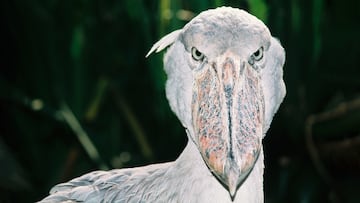The bird that can kill a crocodile breaks the laws of nature and dominates swamps
The bird, which is capable of killing members of its own species, is highly threatened by human activity.

The shoebill, also known as the whalebill, is a high-speed, solitary predator. It preys on fish, amphibians, snakes, and even young crocodiles, thanks to its remarkable ability to remain hidden. However, its powerful beak has contributed to the decline of other species in its habitat, highlighting the intense struggle for survival in the wetlands it calls home.
Scientifically known as Balaeniceps rex, the shoebill is native to the swamps and wetlands of Rwanda, Uganda, Zambia, and South Sudan. Fewer than 5,000 individuals remain in the wild, though some can be found in captivity in European zoos. Institutions such as Pairi Daiza in Belgium have made efforts to understand and meet the species’ specific needs.
The bird’s most distinctive feature is its large, shoe-shaped beak, which provides deadly precision and makes it a formidable hunter. It’s also a giant among birds, standing about 1.2 meters tall and boasting a wingspan of up to 2.3 meters.
Shoebills typically lay their first clutches in late summer. From an early age, the chicks face intense competition: since the parents cannot provide enough food for multiple offspring, the young birds must fight for survival. Only the strongest chick survives, a brutal outcome driven by the scarcity of resources in the African wetlands.
As Explora notes, “In addition to being ruthless with the animals it hunts, this relative of the stork learns early on to become a predator to ensure its survival.” Those that survive these early challenges can live up to 35 years in the wild and as long as 50 years in captivity.
Yet despite its fierce nature and fearsome appearance, the shoebill is increasingly vulnerable to human activity. The International Union for Conservation of Nature (IUCN) has classified the species as “Vulnerable” due to pollution, habitat destruction, and illegal trade—factors that continue to threaten its already declining population.
Get your game on! Whether you’re into NFL touchdowns, NBA buzzer-beaters, world-class soccer goals, or MLB home runs, our app has it all. Dive into live coverage, expert insights, breaking news, exclusive videos, and more – plus, stay updated on the latest in current affairs and entertainment. Download now for all-access coverage, right at your fingertips – anytime, anywhere.


Complete your personal details to comment